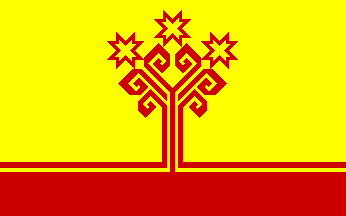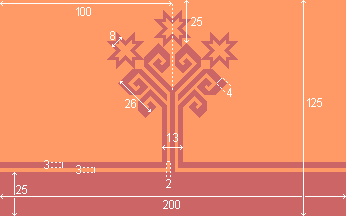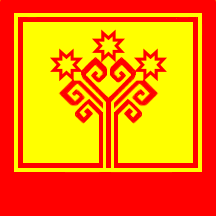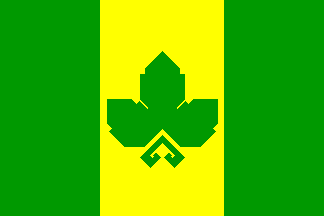
Last modified: 2007-04-14 by antónio martins
Keywords: chuvashia | sun: 8 rays | star: 8 points (fimbriated) | oak | hop | leaf: hop | beer | bukyet chuvashii | buket ĉuvaŝii |
Links: FOTW homepage |
search |
disclaimer and copyright |
write us |
mirrors

(Note: You need an Unicode-aware software and font to correctely view the cyrillic text on this page. See here transliteration details).
Like Bashkor, Chuvash people
are Turkic; strangely they are not Muslim but christian
orthodox.
Giuseppe Bottasini, quoting
[zig94]
Die hard nationalists would tell you how this is one of the oldest peoples on Earth, with unsuspected connections with Sumerians and Egyptians, while, more reasonably, most historians would acknowledge that the Chuvash managed to create one of the first organized societies in northeastern Europe, the (Volga) Bolgar state.
Even so, Chuvashia celebrates today (June 24th) a modest 80th anniversary, commemorating the creation of the Chuvash Autonomous Region within the RSFSR, in 1920. This was upgraded to ASSR in 1925 with confimation of Cheboksary as the capital (Kanash was briefly considered) and some territorial exchanges NE and SW (after a rejected proposal of adding to it all of the current Ulyanovsk Region, with the would-be capital in this city).
There was no separate division corresponding to Chuvashia during the time its territory was under Tatar domination (Kazan Khanate), nor during the tsarist regime — hence this celebration.
António Martins, 23 Jun 2000
On 29 April 1992 Chuvashia
adopted a very original golden-purple
flag, representing a stylized “Tree of Life” (symbol of national
revival) topped with three Suns, an ancient Chuvash device.
Giuseppe Bottasini, quoting
[zig94]
Chuvash seem to like their flag very much, it being
all over the republic. However, variations,
simplifications
and errouneous depictions
are quite often.
António Martins, 01 Aug 1999
The colour (dark red)
of Moscow flag is
established by the law.
Chuvashian red is pupurniy (dark red).
Concerning to other russian flags I can
tell that they usually use red colour.
Nicolay Khimenkov, 02 Mar 1999
The 24th of June chuvash streets and store windows are more decorated
than usual with red and yellow motives and I note that these show the
distinct darker shade of red prescribed by law (contrasting with most flags
in sight, incl. official ones, which use the same
red as the russian national flag). There is even
one of these items showing wavy stripes of both flag patterns where this
difference is clearly visible and obviously intentional. I suspect that the
graphical artist that created the chuvash flag in 1992 (who works for the
city government) might be behind this strive for correctness.
António Martins, 23 Jun 2000
Four 1st level Russian subdivisions use dark red as a major color of its
flags: Moscow City, Mordovia,
Chuvashia and Mariy El.
António Martins, 08 Dec 2006
The flag design is taken from the coat of arms.
The Tree of Life motif is often in many local ornaments — embroidery,
vime and iron works, gastronomy, etc. The 8-pointed star is widely used in all
ethnical republics of Central European Russia
(Udmurtia, Mari-El,
Chuvashia, Tataria, Bashkiria
and Mordovia) and can be found in several of their
flags.
António Martins, 08 Nov 1996
The Chuvash government has recently erected a very tall flag pole in
Ĉeboksary’s main square, in front of the “Yellow House”,
the government headquarters. It’s no less than 25-30 m high, and it
flies permanently a large chuvash flag.
António Martins, 26 Jul 1999

This diagram uses values reduced to the least common denominator
instead of the percentiles of flag width used in the official
construction sheet, annexed to the law and shown in the book
[pvu95].
António Martins, 06 Dec 2002

Detailed view of the tree symbol, with some significant measures (more
than enough to make the others out). It should be noted that the official
construction sheet gives a 2,7% value for each fourth of the suns; that
seems geometrically incorrect as only the slanted lines yield integer
(or rational) numbers. The said value would rather be
√8̅²̅⁄̅2̅, i.e., approx. 5,657
— which would be about 2,828% of the flag width.
António Martins, 02 May 2002
Note that the widest point of the tree seems to be aligned with an
horizontal line distant 2/5ths (50 units) from the flag top, but this
is not explicited on the law (only the top of the tree is). After some
calculation, we see that it is rather approx. 44,548 — indeed
√1̅1̅²̅⁄̅2̅ +
√2̅6̅²̅×̅2̅.
António Martins, 06 Dec 2002

The simplest variants of standarts are accepted in Republics. This
imposing of the arms on a national flag.
More difficultly a composition of heads standarts of Chuvashia.
Sergey Filatov, 10 Oct 2005
Most of these flags are squarish (about 11:12),
rigid and fringed variants of the region (Governors) or Republic (Presidents)
flags with the regional emblem over all.
António Martins, 02 Oct 2005
.gif)
The coat-of-arms shows the same devices (Tree of Life and Suns)
along with golden hop branches and the name of the Republic in gold
on a purple cartouche.
Giuseppe Bottasini, quoting
[zig94]

Bukyet Chuvashii is one the main liquor manufactors in Chuvashia, Russia, and it specialized in beer. This beverage is a national (chuvash) ancient tradition, this republic being almost exclusively responsible for Russia’s rank as the 8th major producer of hop world wide.
This company’s flag is one of the most elegant and vexillologically “perfect” I have ever seen, showing the main part of its logo, a stylized hop leaf, on the central panel of a green-yellow-green vertical triband. (This logo, in both old and new variants, shows the tree suns from the chuvash coat of arms as its “crest” and a ribbon patterned after the chuvash flag.)
The flag comes in two variants: an older one with a pale shade of yellow (almost ivory), very dark green and identical areas; and a more recent one (since last april?) with medium shades and the central panel slightly larger, containing an also larger emblem.
This new version can be seen at the Beer Museum in Cheboksary, and also proeminently hoisted on the ship-shaped out door summer cafes in the Zaliv Park. The older version is very frequent as a table top ornament, usualy crossed with russian or chuvash flags.
António Martins, 22 Dec 2000
Other sites:Anything below this line was not added by the editor of this page.